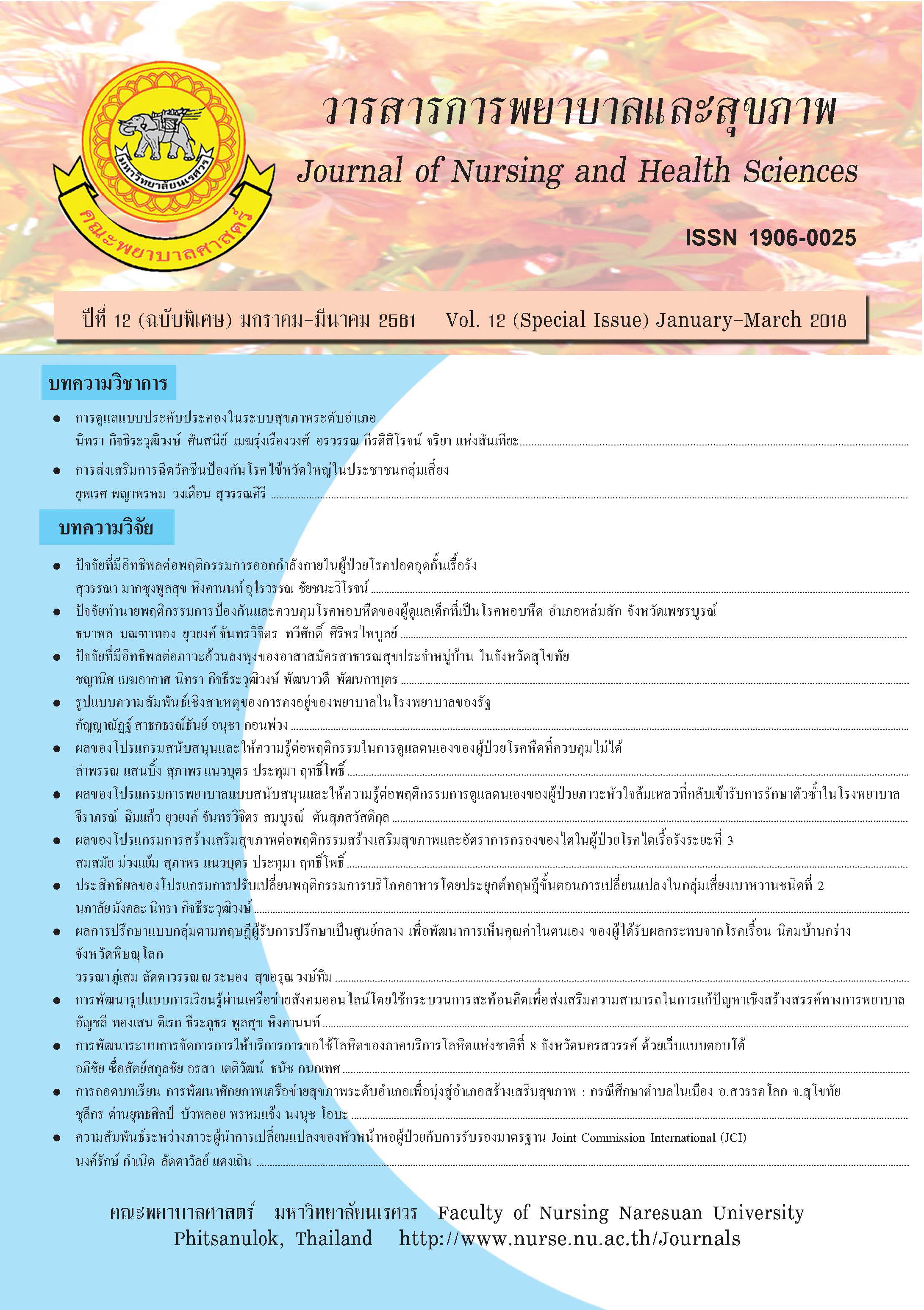การพัฒนารูปแบบการเรียนรู้ผ่านเครือข่ายสังคมออนไลน์โดยใช้กระบวนการสะท้อนคิด เพื่อส่งเสริมความสามารถในการแก้ปัญหาเชิงสร้างสรรค์ทางการพยาบาล
Main Article Content
บทคัดย่อ
การวิจัยครั้งนี้มีจุดประสงค์เพื่อ พัฒนารูปแบบการเรียนรู้ผ่านเครือข่ายสังคมออนไลน์โดยใช้กระบวน การสะท้อนคิด เพื่อส่งเสริมความสามารถในการแก้ปัญหาเชิงสร้างสรรค์ทางการพยาบาล โดยมีวัตถุประสงค์ เพื่อ 1) ศึกษาข้อมูลพื้นฐานสำหรับการพัฒนารูปแบบการเรียนรู้ 2) สร้างรูปแบบการเรียนรู้ 3) ทดลองใช้ รูปแบบการเรียนรู้ และ4) ประเมินการใช้รูปแบบการเรียนรู้ การวิจัยครั้งนี้ ดำเนินไปตามลักษณะของ กระบวนการวิจัยและพัฒนา (Research and Development) มีทั้งหมด 4 ขั้นตอน ดังนี้ ขั้นตอนที่ 1 ศึกษา ข้อมูลพื้นฐานสำหรับการพัฒนารูปแบบ โดยสอบถามความคิดเห็นอาจารย์ผู้สอนในรายวิชาการพยาบาล อนามัยชุมชนจากสถาบันการศึกษาพยาบาล 25 แห่ง เกี่ยวกับความสามารถการแก้ปัญหาเชิงสร้างสรรค์ของ นักศึกษาพยาบาลในปัจจุบัน และสัมภาษณ์ผู้ทรงคุณวุฒิ 5 ท่าน เกี่ยวกับการเรียนรู้ผ่านเครือข่ายสังคม ออนไลน์โดยใช้กระบวนการสะท้อนคิด ขั้นตอนที่ 2 การสร้างรูปแบบการเรียนรู้ผ่านเครือข่ายสังคมออนไลน์ โดยผู้ทรงคุณวุฒิ 5 ท่าน และทดลองนำร่องรูปแบบเพื่อพิจารณาความเป็นไปได้ กับนักศึกษาที่ไม่ใช่ กลุ่มตัวอย่าง จำนวน 30 คน ขั้นตอนที่ 3 ทดลองใช้รูปแบบการเรียนรู้ผ่านเครือข่ายสังคมออนไลน์ โดยนำไป ทดลองใช้กับนักศึกษาคณะพยาบาลศาสตร์ ชั้นปีที่ 4 จำนวน 30 คน วิเคราะห์ข้อมูล โดยใช้ค่าเฉลี่ย ส่วนเบี่ยงเบนมาตรฐาน paired t-test และANOVA และขั้นตอนที่ 4 ประเมินการใช้รูปแบบการเรียนรู้ผ่าน เครือข่ายสังคมออนไลน์โดยใช้กระบวนการสะท้อนคิด เพื่อส่งเสริมความสามารถในการแก้ปัญหาเชิง สร้างสรรค์ทางการพยาบาลวิเคราะห์ข้อมูล โดยใช้ค่าเฉลี่ย ส่วนเบี่ยงเบนมาตรฐาน ผลการวิจัยพบว่า1. ข้อมูลพื้นฐานสำหรับพัฒนารูปแบบการเรียนรู้ พบว่า ความสามารถในการแก้ปัญหาเชิงสร้างสรรค์ ของนักศึกษาพยาบาลในปัจจุบันโดยรวมทุกด้านอยู่ในระดับปานกลาง ( = 2.99, S.D. = 0.57) และ จากการสัมภาษณ์ พบว่าการจัดการเรียนรู้ผ่านเครือข่ายสังคมออนไลน์โดยใช้กระบวนการสะท้อนคิด ประกอบด้วย 5 องค์ประกอบ คือ 1) การทบทวนเหตุการณ์ 2) การบรรยายความรู้สึกต่อเหตุการณ์ 3) การวิเคราะห์เหตุการณ์ 4) การค้นหาข้อสรุป และ5) การวางแนวทางปฏิบัติในอนาคต โดยใช้เทคนิคการ ฟัง การเขียนบันทึก และการวางแผนการแก้ปัญหารายกรณี ผ่านการใช้สื่อสังคมออนไลน์ในเฟสบุ๊ค (Facebook) 2. รูปแบบการเรียนรู้ที่พัฒนาขึ้นในครั้งนี้ ประกอบด้วย 1) ที่มาของรูปแบบการเรียนรู้ผ่านเครือข่าย สังคมออนไลน์โดยใช้กระบวนการสะท้อนคิด แก้ปัญหาเชิงสร้างสรรค์และการเรียนรู้ผ่านเครือข่ายสังคม ออนไลน์ 2) รูปแบบการเรียนรู้ ได้แก่ ขั้นเตรียมความพร้อม ขั้นก่อนการเรียนรู้ ขั้นดำเนินการเรียนรู้ และ ประเมินผล รูปแบบผ่านการตรวจสอบคุณภาพโดยผู้ทรงคุณวุฒิ และผ่านการทดลองนำร่องความเป็นไปได้ ของการใช้รูปแบบ พบว่า มีความเหมาะสมและความสอดคล้องอยู่ในระดับมากที่สุด 3. ผลการทดลองใช้รูปแบบการเรียนรู้ที่พัฒนาขึ้น พบว่า 3.1 นักศึกษาพยาบาลมีความสามารถในการแก้ปัญหาเชิงสร้างสรรค์ทางการพยาบาล หลังเรียน สูงกว่าก่อนเรียนอย่างมีนัยสำคัญทางสถิติที่ระดับ .01 3.2 พฤติกรรมการสะท้อนคิด ก่อนเรียน ระหว่างเรียน และหลังเรียน แตกต่างกันอย่างมีนัยสำคัญ ทางสถิติที่ระดับ .01 4. การประเมินการใช้รูปแบบการเรียนรู้โดยรวมอยู่ในระดับมาก ( = 4.33, S.D. = 0.31)
Article Details
เอกสารอ้างอิง
การสะท้อนคิด : การศึกษาและการปฏิบัติการ
พยาบาลในคลินิก. วารสารคณะพยาบาลศาสตร์
มหาวิทยาลัยบูรพา, 9(2), 35-48.
กระทรวงเทคโนโลยีสารสนเทศและการสื่อสาร. (2559).
การสำรวจการใช้เทคโนโลยีสารสนเทศและ
การสื่อสารในครัวเรือน พ.ศ. 2558. สำนักพัฒนา
ฐานข้อมูล กระทรวงเทคโนโลยีสารสนเทศ และ
การสื่อสาร.
ดรุณี ชุณหะวัต, จริยา ตันติกรกุล และยุวดี ฤๅชา. (2544).
ผลของการฝึกสะท้อนคิดในรายวิชาปฏิบัติต่อ
ความสามารถในการแก้ปัญหาทางการพยาบาล
ของนักศึกษาพยาบาล. วารสารสภาการพยาบาล,
16(3),63-76.
ดุจเดือน เขียวเหลืองและคณะ (2556). การพัฒนา
รูปแบบการจัดการเรียนรู้แบบสะท้อนคิดเพื่อ
สร้างเสริมความสามารถในการตัดสินใจเชิง
จริยธรรมทางการพยาบาล สำหรับนักศึกษา
พยาบาล. วารสารศึกษาศาสตร์ มหาวิทยาลัย
นเรศวร, 15(4), 9-21.
นฤมล เทพนวล. (2557). การพัฒนารูปแบบ SQ4R บน
เครือข่ายสังคมออนไลน์เพื่อส่งเสริมวัฒนธรรม
การอ่าน. วารสารศิลปากรศึกษาศาสตร์วิจัย, 6(1),
206-219.
ทิศนา แขมมณี. (2552). ศาสตร์การสอน: องค์ความรู้
เพื่อการจัดกระบวนการเรียนรู้ที่มีประสิทธิภาพ.
พิมพ์ครั้งที่ 7. กรุงเทพฯ: บริษัทด่านสุทธา
การพิมพ์.
ประพรรธน์ พละชีวะ และจุลลดา จุลเสวก. (2558).
การสร้างทักษะเมตาคอกนิชันด้วยเทคนิคการ
สะท้อนคิดผ่านเครือข่ายสังคมออนไลน์ของ
นักศึกษาหลักสูตรครุศาสตรบัณฑิตในรายวิชา
นวัตกรรมและเทคโนโลยีสารสนเทศทาง
การศึกษา. วารสารบัณฑิตศึกษา มหาวิทยาลัย
ราชภัฏวไลยอลงกรณ์ ในพระบรมราชูปถัมภ์,
9(3), 98-107.
ปวีณภัทร นิธิตันติวัฒน์. (2557). คู่มือแนวการจัดการ
เรียนการสอนโดยใช้การสะท้อนคิด. ราชบุรี:
วิทยาลัยพยาบาลบรมราชชนนี ราชบุรี.
ปิยวัฒน์ เกตุวงศา และศุทธิดา ชวนวัน. (2558). การ
เสริมสร้างทักษะเมตาคอกนิชันด้วยเทคนิคการ
สะท้อนความคิดผ่านเครือข่ายสังคมออนไลน์
ของนักศึกษาหลักสูตรครุศาสตร บัณฑิตใน
รายวิชานวัตกรรมและเทคโนโลยีสารสนเทศ
ทางการศึกษา.วารสารบัณฑิตศึกษามหาวิทยาลัย
ราชภัฏวไลยอลงกรณ์ ในพระบรมราชูปถัมภ์,
9(3), 98-107.
ภาณุวัฒน์ กองราช. (2556). การศึกษาพฤติกรรมการใช้
เครือข่ายสังคมออนไลน์ของวัยรุ่นในประเทศไทย:
กรณีศึกษา Facebook. ปริญญานิพนธ์มหาบัณฑิต,
มหาวิทยาลัยธรรมศาสตร์, กรุงเทพฯ.
เศรษฐพงศ์ มะลิสุวรรณ. (2552). เครือข่ายสังคม(Social
Network) กรณีศึกษา : ยูทูบ (YouTube) สืบค้น
เมื่อ 12 เมษายน 2559, จาก http://krukad.com/
drupal/node/314.
สิทธิชัย ชมพูพาทย์ (2554) การพัฒนาพฤติกรรมการเรียน
การสอนเพื่อการแก้ปัญหาอย่างสร้างสรรค์ของ
ครูและนักเรียนในโรงเรียนส่งเสริมนักเรียนที่มี
ความสามารถพิเศษทางวิทยาศาสตร์ โดยใช้
การวิจัยปฏิบัติการเชิงวิพากษ์. ปริญญานิพนธ์
ปร.ด.,มหาวิทยาลัยศรีนครินทรวิโรฒ, กรุงเทพฯ.
สำนักงานคณะกรรมการการอุดมศึกษา, กระทรวง
ศึกษาธิการ. (2550). กรอบแผนอุดมศึกษา
ระยะยาว15 ปี ฉบับที่ 2 (พ.ศ.2551-2565).
กรุงเทพฯ : โรงพิมพ์แห่งจุฬาลงกรณ์มหาวิทยาลัย
สำนักเทคโนโลยีเพื่อการเรียนการสอน. (2552). ที่มา
ของบล็อก smeducation. สืบค้นเมื่อ 15 มิถุนายน
2559, จาก http://smeducation.wordpress.com/
about.
อัญชลี ทองเสน และวิวัฒน์ มีสุวรรณ์. (2558). ศึกษา
สภาพการใช้เทคโนโลยีบนเครือข่ายสังคม
ออนไลน์ในการจัดการเรียนการสอน สำหรับ
นักศึกษาพยาบาล สถาบันสมทบมหาวิทยาลัย
นเรศวร.การประชุมวิชาการระดับชาติ เทคโนโลยี
การศึกษาสัมพันธ์แห่งประเทศไทย ครั้งที่ 30
วันที่ 21-22 มกราคม 2559.
Baroody, Arthur J. (1993). Problem Solving Reasoning
and Communication. K-8 Helping Children
Think Mathematically. New York : Macmillan.
Boyd, E. M., & Fales, A. W. (1983). Reflective
learning: Key to learning from experience.
Journal of Humanistic Psychology, 23(2),
99-117.
Dewey. J. (1993). How We Think. New York: D.C.
HeaH.
Johns, Christopher (2000). Becoming a Reflective
Practitioner. London: Blackwell Science.
Joyce, Bruce. (2009). Models of teaching. 8th ed. Boston:
Pearson Education.
Matthew-Maich, N. (1996). Becoming through
reflection and professional portfolios. Masters
thesis project, McMaster University, Hamilton,
Ontario, Canada.
Richard, J. Davisdson. (1990). Systems thinking: critical
thinking skills for the 1990s and beyoud, System
Dynamics Review. 9(2): p.331.
Safran, C. (2010). Social Media in Education. Thesis
for the Academic Degree of a Doctor of
Technology, Graz University of Technology.
Sheerens, J., & Bosker, R. (1997). The Foundations of
Educational Effectiveness. London: Pergamon.


